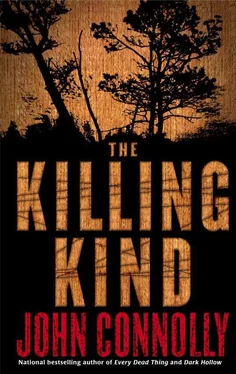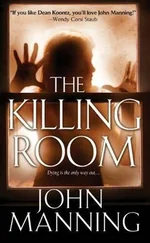I took each step slowly, my gun aimed below me. The final step led into a concrete bunker, furnished with armchairs and an old couch. A dining table stood in the far corner, on a worn Persian rug. To my right was a small galley-style kitchen, separated from the main room by a pair of saloon doors. Wire-rimmed lights hung from the ceiling. A set of shelves in one corner lay empty, a box filled with books and newspapers on the floor beside it. There was a smell of wax polish in the air. The tabletop gleamed, as did the shelves and the breakfast counter.
But it was the walls that drew the eye; every available space, every inch from corner to corner, ceiling to floor, had been illustrated. There were Kohn-like impressions of death upon a dark horse; images of war victims inspired by Dix and Goerg; cities crumbling in a fury of reds and yellows as in Meidner's apocalyptic landscapes. They overlapped one another, blurring at the edges into greens and blues where the pigments had mixed. Images taken from one artist recurred in the work of another, at once out of context yet still part of the greater vision. One of Goerg's demons fell upon the crowds fleeing Meidner's destruction; Kohn's horse wandered among Dix's battlefield corpses.
No wonder his kids were screwed up.
The next room was similarly decorated, although this time the images were medieval in origin and much more ornate. This room was larger than its neighbor, with two double beds on a linoleum floor, a slatted wood divider between them. There were books and magazines on rough shelves, two closets, and a small shower and toilet in one corner, separated from the main room by sliding glass doors. The only light came from a single bedside lamp standing on a table. Close by where I stood were two cardboard boxes filled with women's clothing and an open suitcase containing some men's suits and jackets. All of the clothes looked at least two decades out of date. The sheets had been removed from the beds and tied in two bundles. A vacuum cleaner stood in one corner, its dust bag removed and lying beside it. It seemed that all traces of the bunker's occupants were in the process of being removed.
A door stood half open at the entrance to the third room. I paused as a sound came from inside, a noise like the jangling of chains. I smelled blood on the air. I could sense no movement close to the doorway. Again the sound of metal on metal rang out. I pushed the door open with my foot and drew back against the wall, waiting for the shots. None came. I waited for a few seconds longer before glancing inside.
A butcher's block supported by four thick legs stood in the center of the stone floor. There was old, dried blood at its edges. Beyond it, against the far wall, was a stainless steel table with a sink attachment and a pipe leading from the drain to a sealed metal container below. There were surgical implements on the table, some recently used. I saw a bone saw, and two scalpels with blood on their blades. A cleaver hung from a hook on the stone wall behind. The whole room stank of meat.
It was only when I entered that I saw Angel. He was naked and attached to a metal rail above an iron tub, his arms held over the rail by a pair of handcuffs. He half stood, half knelt in the tub, its sides stained brown with dried blood. His body was twisted toward me, and his mouth had been taped shut. His torso was streaked with blood and sweat, and his eyes were half-open. They closed briefly as I moved to him, and he made a small sound from behind the tape. There was bruising on his face, and a long wound to his right leg; it looked like a knife slash, and had been left to bleed.
I was about to reach around his back to support him before releasing him when the mewling sound rose in pitch. I stepped back and turned his body slightly. A patch of skin, easily six inches square, had been cut from his back, and the exposed flesh pulsed redly. As I stared at the wound, Angel's legs began to shake and he started to sob. I found the keys to the cuffs hanging on a hook, then gripped him around the waist and released him, the full weight of him falling into my arms as I eased him from the tub and lowered him to the floor. I pulled the tape from his mouth as gently as I could, then took a plastic beaker from a shelf and filled it from the sink, the water sending the blood spiraling down into the drain. Angel took the cup and drank deeply, water spilling down his chin and onto his chest.
“Get me my pants,” were his first words.
“Who did this, Angel?”
“Get. Me. My. Damn. Pants. Please.”
His clothes lay in a pile by the tub. I found his chinos, then helped him into them as he sat on the floor, supporting himself as best he could on his weakened arms as he kept his back away from the wall.
“The old man,” he said as we hauled the pants up to his waist. Immediately, they stuck to the wound in his leg and a red stain spread across them. Every time he moved, his face creased with pain and he had to grit his teeth to keep from howling. “There was gunfire from outside, and when I looked around he was disappearing up those stairs. He left the oven open. I might need what's inside.”
He pointed behind me, to where a steel box with a temperature dial at the top stood against the wall. A thin sheet of what might have been paper hung within, assuming paper could bleed. I turned off the dryer, then flipped the door closed with my foot.
“You meet the other two?”
I nodded.
“They're his kids, Bird.”
“I know.”
“What a fuckin' family.” He nearly smiled. “You kill them?”
“I think so.”
“What does that mean?”
“The woman's dead. I fed Pudd to his pets.”
I left Angel and walked over to where a staircase led up from a small doorway at the back of the room. To the left of the first step was a room with another bed and a crucifix hanging from the ceiling. The walls here were covered with shelving, the weight of their books causing them to sag. Some had already been removed in preparation for flight, but many still remained; the arrival of Angel must have caused Faulkner to rearrange his priorities. I doubted that he had been allowed many live subjects on which to practice before. There was a workbench against one wall, inks, pens, knives, and nibs arrayed carefully in a metal carrying case on top of it. In an alcove opposite the bedroom, a generator hummed.
When I went back into Faulkner's preparation room, Angel had struggled to his feet and stood, slightly hunched over, at the wall, supporting himself with his hands, his injured leg raised slightly. His back had begun to bleed again.
“You think you can make it up?”
He nodded. I took his left arm, draped it around my shoulder, then held him carefully around the waist. Slowly, and with the agony etched clearly on his face, he made his way up the stone steps. He was almost at the top when his foot slipped and his back banged against the wall. It left a bright red streak as he briefly lost consciousness, and I had to carry him the rest of the way. The stairs ended in a kind of alcove where a steel door stood open. A sheet of thick plastic lay beside it, slapping in the wind. Beside it, a shape lay rolled up in a second sheet stained inside with blood. Part of Voisine's face was exposed. I recalled Pudd's anger at the wounds inflicted by Angel on his associate; it looked like Voisine had since died from them.
Angel came to as I laid him, facedown, on the floor. I removed the.38 from my holster and pressed it into his hand.
“You killed Voisine.”
His eyes focused blearily on me. “Good. Can I piss on his grave?”
“I'll make some calls, see what I can do.”
“Where are you going?”
“To find Faulkner.”
“You find him, you tell him I sent you.”
The rain fell relentlessly and the ground had turned to mud as I stepped carefully onto the grass. Some fifty feet behind me, the woman still lay where she had fallen and no sound came from inside Mr. Pudd's spider house. The lighthouse was at my back, and in front of me a grass verge sloped down to the boathouse. There, in a sheltered inlet, was a small floating jetty. The door to the boathouse stood open and a boat bobbed at the end of the concrete ramp. It was a little Cape Craft runabout, with an Evinrude outboard. A figure stood on the deck, pouring diesel into the engine's fuel hatch. The rain fell on its bare skull, on the long white hair plastered to its face and shoulders, on its black coat and black leather shoes. It must have sensed me approaching, for it looked up, the diesel spilling over the deck as its concentration lapsed.
Читать дальше












